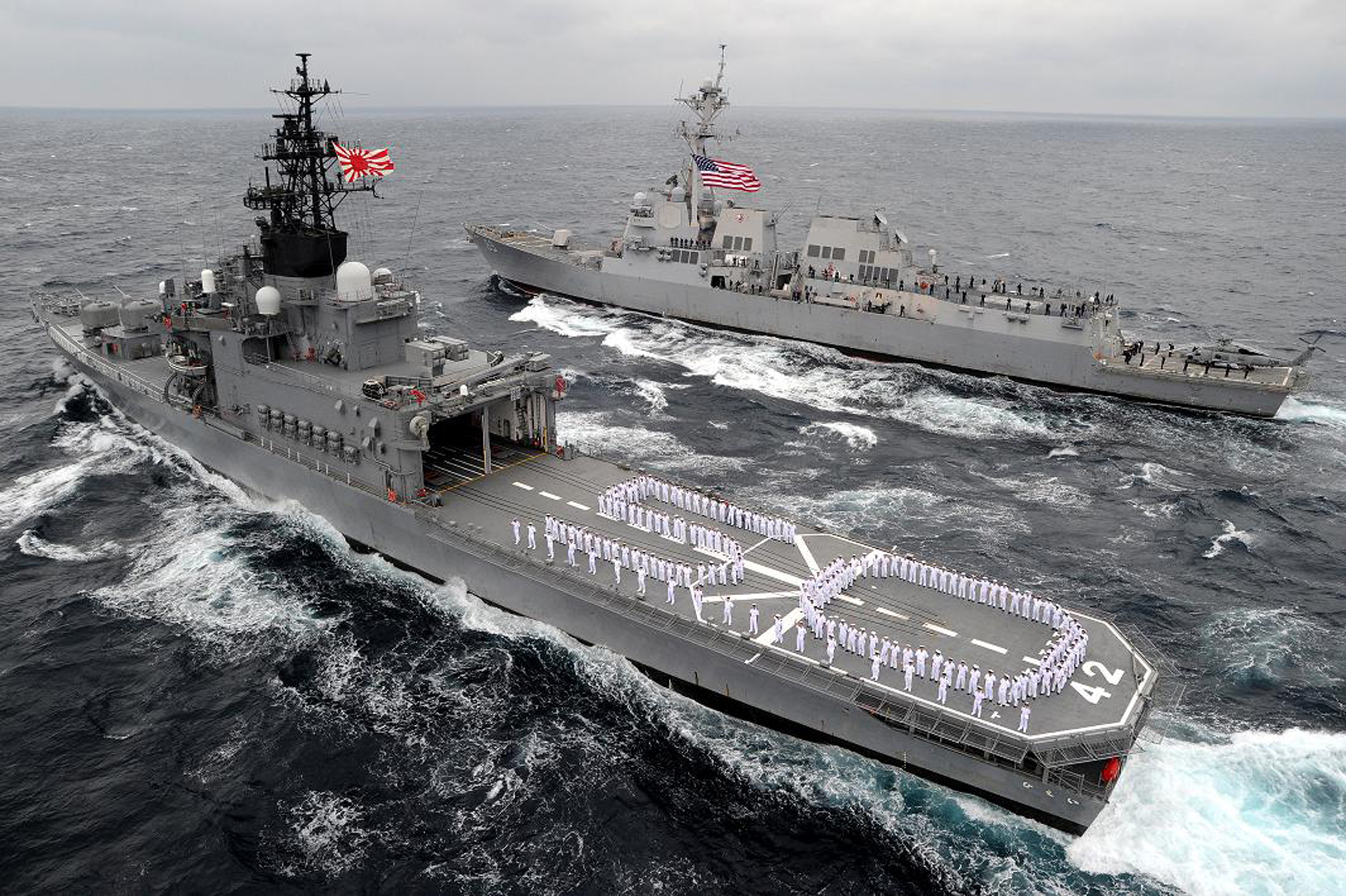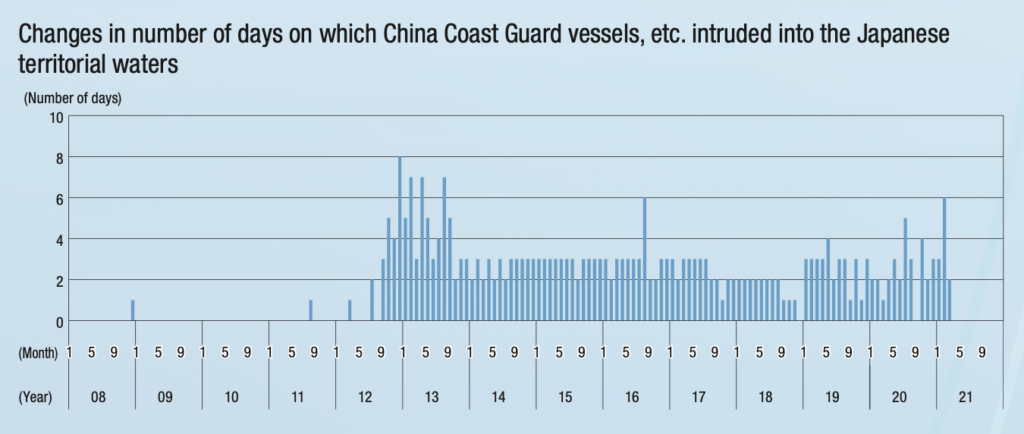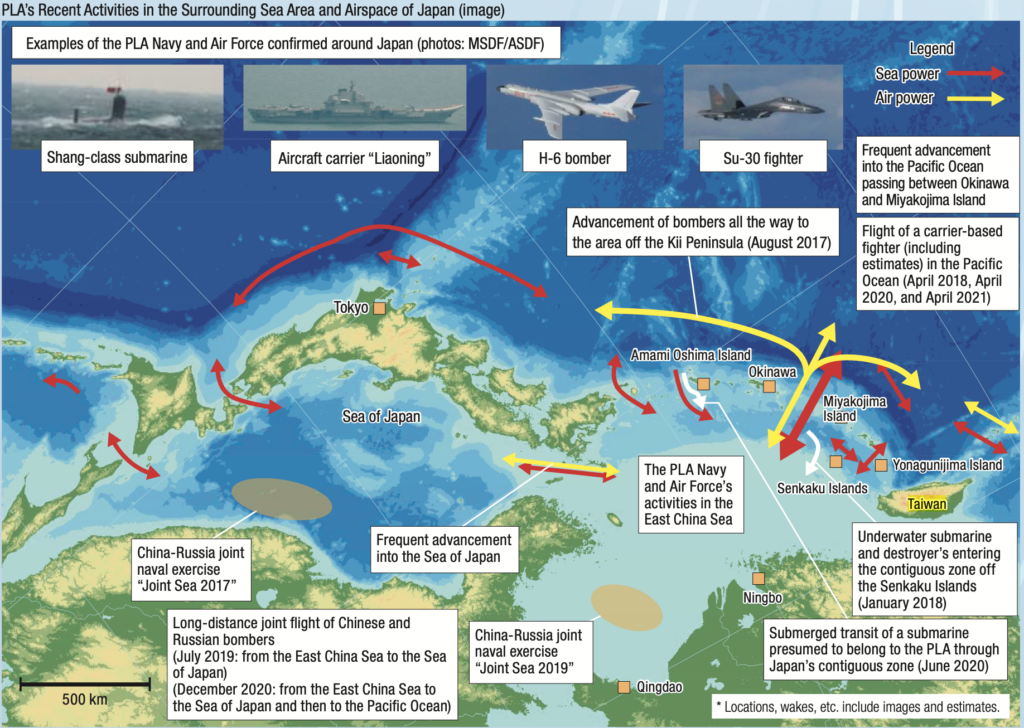
Japan’s new defense White Paper calls for more all-domain planning and working more closely with allies. (DoD)
WASHINGTON: Japan’s new Defense White Paper warns that China’s growing military muscle, overflights and naval incursions “have become a matter of grave concern to the region including Japan and the international community,” one which will require new capabilities and doctrine to counter.
The report, released this week, is notable for its statement that the stability of Taiwan is important for Japanese interests, the first time such a claim has appeared in this document. It also pushes for greater investments in multi-domain operations and military space efforts.
Overriding everything in the White Paper is a clear-eyed view of Beijing’s actions over the last decade: The term “grave concern” appears several times in the White Paper to describe China.
To counter that threat, Japan is reaching out to a much broader array of friends and partners, in addition to its only treaty ally, the United States, notes Dean Cheng, a Heritage Foundation expert on China and the region.
“Japan is openly embracing a ‘free and open Indo-Pacific,’ including cooperation with India [and] European states,” Cheng writes in an email. “This is a steady but major shift from the days when Japan ONLY cooperated with the US. It indicates that Japan, like Germany, is steadily moving towards a more ‘normal’ state of foreign relations.
“As important,” Cheng added, “it reflects the Japanese effort to ensure that in the event of a confrontation with North Korea or China, Japan will have multiple friends in its corner.”
The Japanese view of China’s recent actions in the region is stark.
“China has relentlessly continued attempts to unilaterally change the status quo by coercion in the sea area around the Senkaku Islands, leading to a grave matter of concern. Its actions involving unilateral assertions over Japan’s territorial waters around the Senkaku Islands are, fundamentally, a violation of international law,” the Ministry of Defense’s official English version of the paper says.

Credit: Japanese Defense Ministry
In a sharp message to the Chinese, the White Paper offers this prescription for a response to anyone who might try to occupy a Japanese island.
“In response to attack on Japan including its remote islands, the SDF will quickly maneuver and deploy requisite units to block access and landing of invading forces while ensuring maritime and air superiority. Even when maintaining maritime and air superiority becomes untenable, the SDF will block invading forces’ access and landing from outside their threat envelopes. Should any part of the territory be occupied, the SDF will retake it by employing all necessary measures,” it says.
While the White Paper offers few details, it includes several intriguing mentions of either cross domain or Multi Domain Operations, like this one: “To deter and counter qualitatively and quantitatively superior military threats, it is necessary to realize cross-domain operations that organically fuse capabilities in traditional domains- land, sea, and air-with capabilities in new domains-space, cyberspace and electromagnetic spectrum.”
Several pages of the paper speak of Electromagnetic Spectrum, cyber and space capabilities, but again it offers very few examples.
Cheng assesses that this “explicit discussion of space domain” in the White Paper “is a quiet but clear recognition that space is likely to be a contested domain, even for Japan, and also that Japan must act to guarantee its own interests in the space domain.”
He says that the “explicit statement that Japan will use space for ‘information collection, as well as commitment to improved space situational awareness, indicate growing Japanese space capabilities, including intelligence-collection, once virtually taboo to discuss.”

Heading further south to the former Japanese territory now known as Taiwan, the Japanese say repeated incursions around the island state by Chinese ships and aircraft have created a “situation with a sense of crisis more than ever before.”
This marks the first time Japan has mentioned the importance of stability in the Taiwan Strait in its Defense White Papers, says Heritage Foundation’s Japan expert Bruce Klingner.
“Stabilizing the situation surrounding Taiwan is important for Japan’s security and the stability of the international community. Therefore, it is necessary that we pay close attention to the situation with a sense of crisis more than ever before,” the White Paper says.
“Japan’s increasing concern with China’s intimidation of its neighbors triggered a shift toward greater willingness to publicly align its national interests with the security of Taiwan,” he said. “In recent months, Tokyo has issued increasingly bold statements of support for Taiwan against Chinese intimidation, even hinting at military support during potential hostilities.”
The Japanese, in fact, assess that the overall military balance between China and Taiwan “is tilting to China’s favor, and the gap appears to be growing year by year.” US arms sales and Freedom of Navigation Operations (FONOPS) through the Taiwan Strait are hailed as important counters to the Chinese.
Can Japan actually back up its policy statements in the event of Chinese action? Klingner is skeptical.
“Japan has developed a formidable military by implementing significant changes to security legislation and procuring an impressive array of sophisticated weapons. Yet, progress in altering Japan’s security posture has always lagged behind faster-moving regional threats,” he says in an email.
“Despite significant improvements in recent years, Japan’s Self-Defense Forces still suffer significant shortcomings in their ability to conduct truly joint and combined operations. This has led to less effective battlefield awareness, targeting, combined arms operations, and close air support.”























